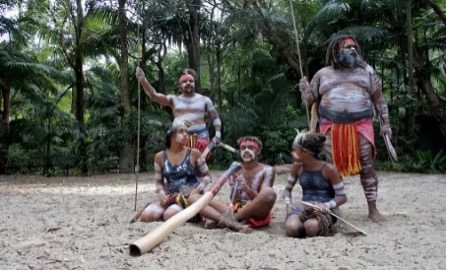Australian Aboriginal English
There are several varieties of the English language used by Indigenous Australians. These varieties, which developed differently in different parts of Australia, vary along a continuum, from forms close to General to more nonstandard forms. There are distinctive features of accent, grammar, words, and meanings, as well as language use. The furthest extent of the Aboriginal dialect is Australian Kriol language, which is not mutually intelligible with General Australian English. E.g. on the Torres Strait Islands, there is a distinctive dialect known as Torres Strait English.
Specific features of Aboriginal English differ between regions. In Nyungar country in Perth, Western Australia, they include address terms and kinship, uninverted questions (That’s your Auntie?), the utterance tag unna, and Nyungar terms such as boya, boodjar, maya-maya, and moorditji, among other features. Specific terms can be used to refer to local or regional varieties for example Koori or Murri English, Broome lingo, and Noongar English. Aboriginal English varieties also occur in Indigenous-authored fictional broadcast media, including kinship words like cousin brother, brother boys, sister girl and daughter girl, and other frequent words such as blackfella(s) and mob.
Aboriginal English does not make use of auxiliary verbs, such as to be and to have, or copulas to link things together. For example, we are working=we workin’. Linguists do not regard this as just dropping words out, but as a fundamental change to the way in which English is constructed. In Aboriginal English, the pronouns he and him may be used for females and inanimate objects in additional to the expected masculine case. But “him” may be found as the subject of a verb.
Most Australian Aboriginal languages have three- or five-vowel systems, and these form the substrate for Aboriginal English vowel pronunciations. Balanda is a word used by the Yolŋu people for European people; originally from the Makassarese language, via Malay orang Belanda [Dutch person]. Aboriginal people often refer to themselves and other Aboriginal people as “blackfellas”. The Australian Kriol term for an Aboriginal person is “blackbala”, which comes from this term. Many Aboriginal people use the word “business’ in a distinct way, to mean “matters”. Funeral and mourning practices are commonly known as “sorry business”. Financial matters are referred to as “money business”, and the secret-sacred rituals distinct to each sex are referred to as “women’s business” or “secret women’s business” and “men’s business.” Many Aboriginal people refer to their house as their “camp”.
Cheeky/tjiki” may be used to mean: sly, cunning, malicious, malevolent, spiteful, ill-disposed, ill-natured, mischievous, vicious, bad, wicked, evil. It can be used to describe a person, dog, mosquito, or snake, and “a cheeky bugger” is a universal substitute for just about anything or anybody on earth. It can be used to denote a dangerous or aggressive animal or person; so, for instance, it could be used to describe a dog that is likely to bite or attack.


